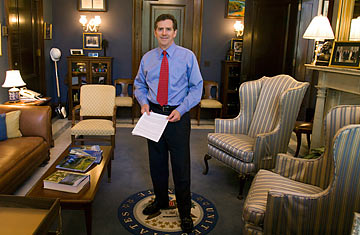
Sen. Jim DeMint, R-S.C., stands in his office on Capitol Hill
Senator Jim DeMint knows when a brand's gone bad and what to do to fix it. The South Carolina Republican spent more than 25 years in advertising before going into politics, and his demeanor — from the pin stripe suit to his salesman pitch delivered with a smile — has a Mad Men quality to it, almost as if Don Draper had been thrown forward 50 years and his only client was the Tea Party movement.
The Grand Ole Party's brand has been failing for some time, DeMint says in an interview at the Capitol Hill Club — an exclusive Washington institution for Republican members and Senators. "The angst was growing during the Clinton years, during the Bush years. And then the bailout was the wake up call," DeMint says. "The Tea Parties, they're just saying: 'Enough is enough.' The question is are Republicans going to open their arms and say, 'We're sorry we made a mistake, trust us again.' Or are they going to keep spit-balling them?"
For years, DeMint has been the Cassandra of the fiscal right, warning that his colleagues were ignoring their base on everything from No Child Left Behind and the Medicare Prescription Drug Program to the Bridge to Nowhere. Such gloom and doom — not to mention to DeMint's amazing capacity to single—handedly gum up the Senate when he objects to a spending bill — would in years past have earned him the chairmanship of the Subcommittee for Underwater Basket Weaving.
But this cycle, Jim DeMint is a prophet. "I think for most Republicans in the Senate the Tea Party is viewed as a threat; to me it's the cavalry I've been waiting for," DeMint says with a laugh.
And so, with his army at his back — an army that has given him more than $1 million to recruit potential lieutenants — DeMint set off to remake the Republican Party's brand. He had his political action committee rate all of his colleagues on their ideological purity; only one person scored 100, DeMint. His first target was one of the lowest scorers, Pennsylvania Senator Arlen Specter. Disgusted with Specter's betrayal on the stimulus bill and weary of fighting the ardent appropriator's earmarks, DeMint endorsed Specter's primary opponent, former Pennsylvania Rep. Pat Toomey. Five days later Specter left the Republican party, a victory in DeMint's book.
Next DeMint bucked the party establishment, which had lined up behind Florida Governor Charlie Crist to fill retiring Senator Mel Martinez's seat. DeMint endorsed little-known Marco Rubio, a former Florida Speaker of the House, and helped him raise more than $300,000. "Jim DeMint believed in me when the only people who believed in me lived in my house," Rubio told the annual Conservative Political Action Conference to a standing ovation and shouts of "DeMint for President!" Crist last month left the Republican Party to run as an Independent after polls showed Rubio beating him by more than 20 points in the GOP primary.
Since then, DeMint has endorsed what he calls "rock-solid Republicans" in Senate GOP primaries in California, Texas, Colorado, Indiana, Kentucky and Utah. None are the candidates his party leaders would prefer. "When the grassroots gravitate towards a candidate and that candidate is not supported by the leadership here, I do everything I can to get those candidates a voice and a platform so at least Republicans know that they have an alternative," DeMint says. Sometimes his efforts are successful, as with Rand Paul, who on Tuesday beat Senate Minority Leader Mitch McConnell's protégé, Kentucky Secretary of State Trey Grayson, to become the Republican nominee for the Senate in the Bluegrass State. Other times, he's not: his pick for the open Indiana Senate seat, Marlin Stutzman, lost to former Senator Dan Coats even after DeMint raised $200,000 for him.
For some Republicans, DeMint is fighting an ideological war at the expense of practical politics. He and his candidates are drawing millions away from the party, its committees and their candidates. DeMint's snowballing effort has frustrated Senator John Cornyn, charged with electing Republicans to the Senate. DeMint's goal "is to try and move the Republican conference in a more conservative direction," Cornyn told McClatchy Papers last week. "But I think as a pragmatic matter, we've got to nominate Republicans who can get elected in their states."
Is the former ad man starting a revolution? No, but he'll settle for five more Republicans like him in the Senate come November, a prospect that scares Democrats and worries some Republicans who see DeMint as an obstructionist. "Jim is trying to express the frustration that a lot of people feel and I think that's a healthy thing as long as we can come together after the primary," says the senior senator from South Carolina, Lindsey Graham, also a Republican. "But somebody's got to fix immigration, somebody's got to fix Social Security. Somebody's got to do something about out long-term debt and that's going to require bipartisanship."
But, to DeMint, bipartisanship is not a slogan that's going to work for Republicans — or Democrats — in 2010.
